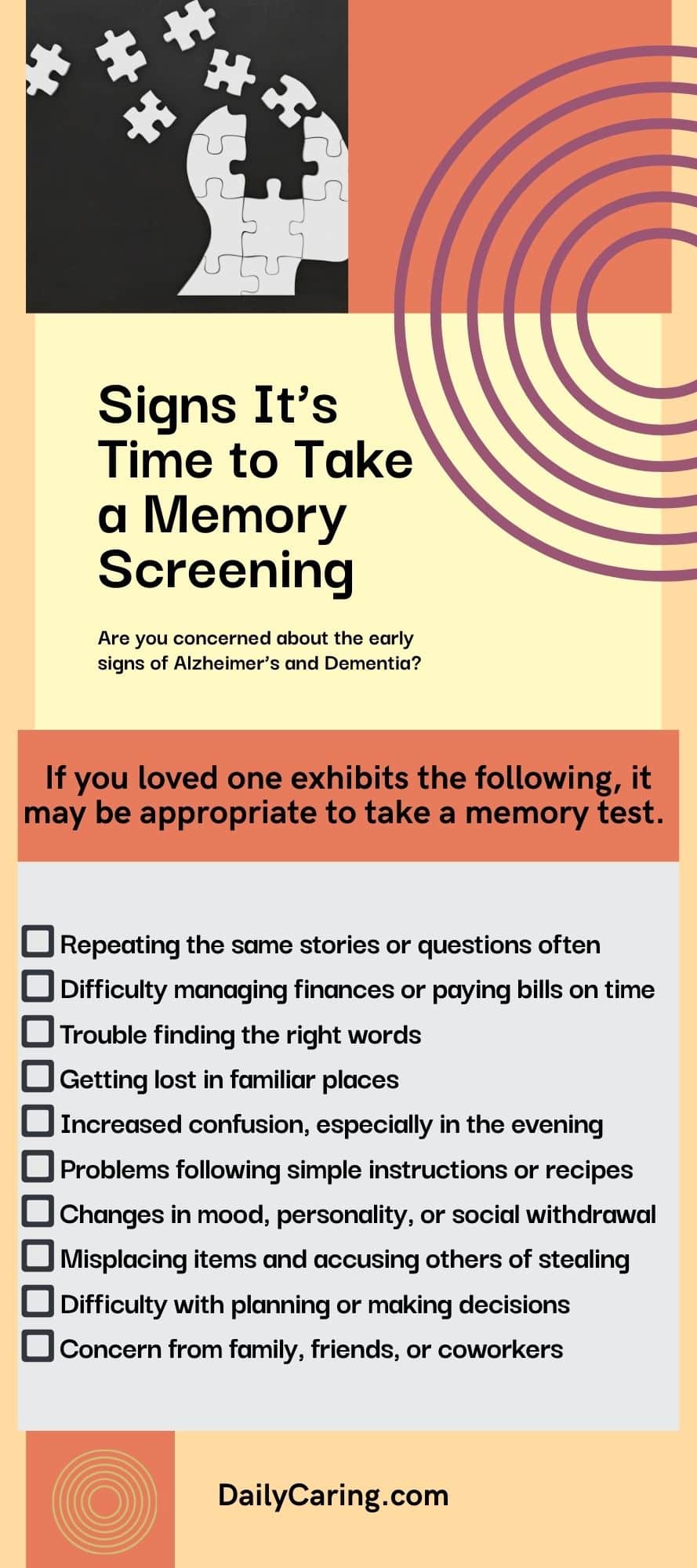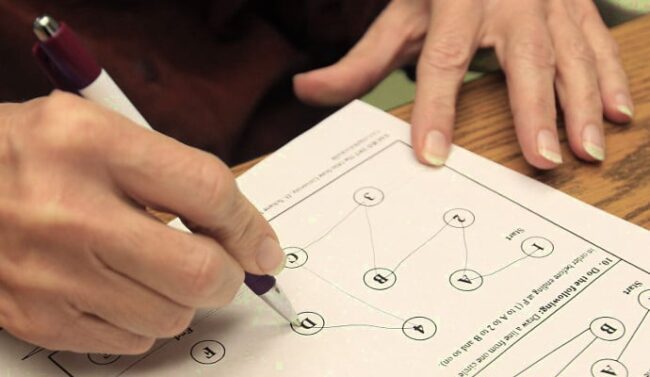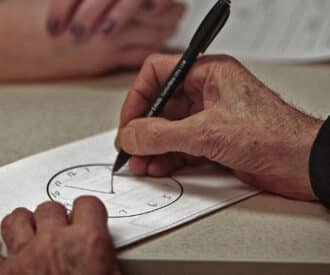The SAGE test for Alzheimer's Disease is a brief, self-administered cognitive assessment tool to detect early signs of Alzheimer's disease and other cognitive impairments. SAGE stands for “Self-Administered Gerocognitive Exam” and can be a great tool for early stage detection.
Table of Contents
- How the SAGE Test works
- How to take the SAGE Test at home
- Why it’s essential to discuss test results with a doctor
- Why an early Alzheimer’s diagnosis is helpful
- Is it too late to improve brain health?
- Get 12 top dementia care tips
The SAGE Test evaluates memory, reasoning, language, and problem-solving skills through a series of questions and tasks. While it is not a diagnostic tool, it helps identify individuals who may need further evaluation by healthcare professionals. Below, we'll examine the SAGE test in detail.
Simple Home Test Detects Early Signs of Dementia and Cognitive Decline
If you suspect that a family member or friend is having a problem with memory loss, thinking clearly, or judgment, you may want them to take the SAGE test for dementia.
This at-home pen-and-paper test is free, takes just 15 minutes, and accurately identifies early symptoms of Alzheimer’s disease or dementia.
And if the stress and exhaustion of caregiving make you feel like your brain isn’t working anymore, this quick test can reassure you that there’s no problem with your cognitive function.
We explain how the test works, how to take it at home, and why discussing the results with a doctor is extremely important. We also share 12 dementia care tips that caregivers wish they’d known sooner.
How Does the SAGE Test For Dementia Work?
SAGE stands for Self-Administered Gerocognitive Examination and was developed by researchers at The Ohio State University Wexner Medical Center.
The SAGE test has 12 questions covering all cognitive aspects, including memory, problem-solving, and language.
There are four different versions of the test. They’re similar enough, but having multiple versions means that someone could take the test once a year and not improve their score each year just from taking it before.
This way, the test is slightly different each time.
Signs It's Time for a Cognitive Screening
The infographic below highlights several of the signs it might be time for a loved one to take a cognitive screening.

Detect Early Cognitive Decline: Take the SAGE Test At Home
Anyone can take the SAGE test. It’s free, and you can get it on the Ohio State University website. –> Download the official SAGE test
Click the “Download the Test” button, agree to the terms, and choose one of the 4 test versions in your older adult’s primary language to download (or save all four versions to your computer for future use).
Print the test and take it with a pen or pencil. There’s no time limit, but most people finish in about 15 minutes.
Sample questions from the quiz:
- How many nickels are in 60 cents?
- You are buying $13.45 of groceries. How much change would you receive back from a $20 bill?
- Write down the names of 12 different animals or pets.
- The clock drawing test- Draw a large face of a clock and write in the numbers. Position the hands for 10 minutes after 11 o'clock. On your clock, label “L” for the long hand and “S” for the short hand.

Discuss Test Results With Your Primary Care Physician
Don’t assume that the test results are equal to any formal diagnosis of dementia.
The SAGE test is a screening tool that helps doctors detect early signs of cognitive impairment that are typically not noticeable during a regular office visit.
When the test is repeated over time, doctors can monitor changes in cognitive ability. This helps them detect and treat health conditions early.
That’s why it's essential to bring the completed test to your physician for review. If there are signs of cognitive impairment, they may recommend further testing.
What Happens After Taking the SAGE Test?
Once the SAGE test is complete, it’s important to share the results with a healthcare provider. While this cognitive screening tool can highlight potential concerns, only a doctor can interpret the results and determine the next steps.
Start with your primary care doctor. They may recommend further evaluation or refer you to a specialist, such as a neurologist, geriatrician, or neuropsychologist, who has experience in detecting early stages of Alzheimer’s.
Follow-up evaluations may include:
- A more detailed cognitive screening like the MoCA (Montreal Cognitive Assessment)
- Lab and blood tests to check for treatable causes of memory problems, such as a vitamin deficiency or thyroid issues
- Neuroimaging (such as an MRI or CT scan) to look for structural brain changes or other medical conditions
Getting an early diagnosis—whether it confirms Alzheimer’s, another type of dementia, or a different health issue—can help with treatment planning, support services, and starting medications or lifestyle changes that may help slow progression or improve quality of life.
🧠 5 Things to Do If Your Loved One Fails the SAGE Test
- Schedule a doctor’s appointment.
Bring the completed test and ask for a medical evaluation, starting with their primary care provider. - Request a referral to a specialist.
A neurologist, geriatrician, or memory clinic can conduct a full cognitive assessment and recommend next steps. - Ask about further testing.
This may include blood work, the MoCA test, and neuroimaging (MRI or CT scan) to look for underlying conditions. - Begin organizing legal and care planning documents.
Start early with a power of attorney, a living will, and financial planning while your loved one is still able to participate. - Look into caregiver support and resources.
Contact the Alzheimer’s Association or your local Area Agency on Aging for guidance and community-based help.

Why You Should Want an Early Alzheimer’s Diagnosis
The SAGE test is helpful because it helps you understand if your concerns are something to be worried about.
If the results seem to indicate that there could be a problem, you might think there’s no point in talking with the doctor because there’s no cure for dementia.
However, an early Alzheimer’s or dementia diagnosis has significant benefits.
The most important is that a treatable condition could be the cause of cognitive impairment. Finding out sooner means getting treatment ASAP to eliminate the cognitive symptoms.
Suppose the cognitive impairment is caused by Alzheimer’s or dementia. In that case, a significant benefit is that starting treatment early is far more effective in managing symptoms and delaying disease progression.
12 Dementia Care Tips From Experienced Caregivers
Caring for someone with dementia isn’t intuitive and doesn’t come naturally. There’s a lot to learn, but you don’t have to figure everything out the hard way.
In a helpful article at Verywell, social worker Esther Heerema shares 12 dementia care tips that caregivers have learned and wished they’d known sooner.
This advice isn’t meant to add pressure or unrealistic expectations to your demanding job.
They’re tips from caregivers who have “been there and done that” that can lighten your load, reduce stress, and help you cope with the challenges.
Here, we share highlights from Esther’s article and some of our insights.
1. It’s not worth it to argue with someone who has dementia
Alzheimer’s and dementia cause your older adult’s brain to malfunction.
When they say things that don’t make sense or are untrue, they believe what they’re saying because it’s what their brain tells them.
It’s frustrating to hear things that aren’t true and instinctive to try to correct or remind. But that will only lead to both of you arguing or getting upset.
And you can’t win an argument with someone who can no longer use reason or logic consistently.
2. Ignoring symptoms won't make them go away
When you notice your older adult struggling with memory, thinking, or judgment, it’s scary to think that they might have dementia.
Because it can be so hard to accept, many people hope that the symptoms will go away on their own or that they’re mistaken.
But the situation isn’t going to fix itself.
The best thing to do is to have them see their doctor for a thorough exam. First, there are many treatable health conditions that cause dementia-like symptoms.
Second, even if dementia has no cure, early diagnosis means that treatments will be more effective and could delay progression, reduce symptoms, and improve quality of life.
3. Too many medications can make people feel and act more confused
Medications prescribed to relieve symptoms can sometimes make dementia symptoms worse or create new problems, like increasing disorientation or agitation.
This can happen because seniors are at higher risk for problems related to medication side effects or drug interactions. Dementia can also change how certain medications affect the brain.
To reduce medication-related problems, call the doctor if you suspect that a new medication is causing a problem and ask them to find alternatives that could work better.
It’s also essential to have the doctor regularly review all medications and supplements to ensure every single one is still needed.
4. Use validation therapy or therapeutic fibs to respond kindly
Dementia care experts recommend joining your older adult in their reality rather than trying to force them back into ours.
Trying to get them to understand facts or our reality usually causes confusion, anxiety, fear, and anger.
Someone with dementia may insist that their children are waiting for their mother to pick them up, they need to get to the office even though they’re retired, or they’re going to visit a relative who passed away long ago.
Instead of telling them that they’re wrong, use validation therapy or therapeutic fibs to respond kindly to their version of reality.
Gently ask an open-ended question about the person they’ll see or the activity they want to do. Or join their reality by saying OK, going along with the scenario for a while, then redirecting to a different activity.
Validating their reality and allowing them to express their thoughts helps them feel calmer and happier.
5. It’s never too late to improve brain health
After finding out that your older adult has dementia, it might seem like improving brain health would be useless.
But healthy habits can genuinely help a brain with dementia. It’s possible to slow the progression of the disease, reduce symptoms, and improve quality of life.
Regular physical exercise, mental stimulation, and activity engagement all help improve brain health.
6. Share your challenges and get help
Caregiving, especially dementia care, can be a lonely and exhausting job. Instead of doing everything alone, talk about your challenges and reach out to people who can help.
It can be challenging to seek out or accept help, but caregivers who have gotten help often wish they’d done it sooner – it’s worth a try.
Knowing you’re not the only one going through this or getting a few hours of rest can make a big difference.
That could mean asking family or friends to step up, hiring in-home care, moving to a care community, using respite care, or joining a caregiver support group.
If you’re unsure where to start, call the Alzheimer’s Association or contact your local Area Agency on Aging to connect with local caregiving resources.
7. Choose one small thing to do for yourself
When caring for someone, it’s instinctive to focus 100% on them…until you get burned out. But that’s not good for you or your older adult.
Taking long vacations or hours for yourself each day is unrealistic, but you’d be surprised at how effective short breaks can be.
Doing something for yourself, whether 30 seconds, 5 minutes, or an hour, will help you recharge and reduce the risk of burnout.
Get 10 practical ideas for short breaks here.
8. Choose your priorities and let the rest go
Because you care so much about your older adult, you want to do as much as you can, as perfectly as you can.
But holding yourself to those unrealistic expectations causes frustration, resentment, and exhaustion.
Instead, save your mental and physical health by picking your battles.
Choose the top priorities and let the less important things go. Consider how important each item will be in a week, month, or year.
9. Have tough conversations about medical decisions and choices
Taking care of important legal documents like a will, living will, or power of attorney is something that many people want to put off.
But talking about end-of-life choices and getting the paperwork done before a health emergency can save you from making hard choices or running into legal problems in the middle of a crisis.
Plus, many older adults have greater peace of mind knowing their wishes will be honored.
10. Remember that they genuinely can't control their behavior
Dementia can’t be seen from the outside, so many people assume that the person can control their difficult or irritating behavior. It’s natural to think their actions are personally directed toward you.
That’s not true. Dementia physically damages the brain, affecting personality, behavior, decision-making, and judgment.
Knowing that it’s the disease talking can help you take things less personally, reduce the sting of hurtful accusations, or help you stay calm when they’ve asked you the same question for the 37th time.
11. 20 minutes later can feel like a whole new day
If you’re helping your older adult with an activity of daily living and they get agitated or combative, it can help to stop and take a short break.
Rather than fighting through and making the situation worse, stepping away to give them (and you) time to calm down can make a big difference.
Please ensure they’re safe and go to another room for 20 minutes. When you come back and approach calmly, they’ll often be more cooperative.
For example, if mom starts yelling and pushing you when you announce it’s time for a shower, give her some space and return to it in a little while, perhaps using a different approach.
This won't always work, but it's worth a try.
12. Quality of life is still possible
It isn’t easy to cope with dementia, both for you and your older adult. But finding ways to enjoy life and have a good quality of life is still possible.
You don’t have to pretend that the challenges and pain don’t exist. Try to focus on the positives, no matter how small, and adapt activities to their remaining abilities.
Frequently Asked Questions About the SAGE Test
What does the SAGE test measure?
The SAGE test evaluates cognitive functions such as memory, problem-solving, language skills, and reasoning. It helps identify early signs of Alzheimer’s and other types of dementia.
Is the SAGE test a diagnosis for Alzheimer’s disease?
No. The SAGE test is a screening tool. It can’t diagnose Alzheimer’s or other forms of dementia, but can signal that further medical evaluation is needed.
Can I score the test myself?
While it’s possible to find answer keys online, it's better to have a doctor interpret the results. They can spot patterns and determine if more tests are needed.
Who should take the SAGE test?
It’s most useful for adults experiencing memory issues or other signs of cognitive decline. It can also be used to create a cognitive baseline and track changes over time.
How often can the SAGE test be taken?
Because there are four versions of the test, it can be taken once a year without “practicing” the same questions. This makes it useful for ongoing monitoring.
Where do I take the SAGE test?
The test is self-administered and taken at home. You can print it from the Ohio State University Wexner Medical Center website.
What happens after taking the SAGE test?
Bring the completed test to a doctor. They may recommend further testing, such as the MoCA or MRI scans, or refer you to a neurologist or geriatric specialist.
Recommended for you:
- 7 Treatable Diseases That Mimic Alzheimer’s
- Testing for Dementia: The Montreal Cognitive Assessment (MoCA)
- Mild Cognitive Impairment: Not Dementia, But More Than Normal Forgetfulness
About the Author

Connie Chow
Connie was a hands-on caregiver for her grandmother for 20 years. (Grandma made it to 101 years old!) She knows how challenging, overwhelming, and all-consuming caring for an older adult can be. She also knows how important support is — especially in the form of practical solutions, valuable resources, and self-care tips.





My 93 year old mother has stage 4 Alzheimers and has lived on her own for 31 years. Mother has carers twice a day and has no recollection of them whatsoever. Mother is deaf, has an arthritic knee and is becoming increasingly incontinent. She refuses to wear hearing aids, glasses, slippers , incontinence underwear or use a walking stick. Mother is obsessed with her finances and constantly asks where her cheque book is and who has got her bank card. My brother and I are her POA’s but this is beyond her understanding. She has managed to render her electric fire useless due to her obsession with the height of the flame which is barely visible when in use. The fire has been serviced and repaired 5 times this year so far. Mother’s diet is frugal and she seems to exist on packets of biscuits. Her senseless shopping lists which she writes daily are a reflection of her troubled mind. Mother has been assessed by a registered authority and deemed to have ” capacity” which means she cannot be placed into a Care Home yet. Meanwhile, she is a constant source of worry and concern. We await her further demise as she exists in her comfort bubble of ignorance and contentment.
If you and your brother are your Mother’s POAs, it seems like you would be able to make decisions on her behalf. But if the authorities won’t let you make a change in your Mother’s living situation, perhaps you could increase the hours for her in-home caregivers to increase her health and safety. You may also want to take safety precautions like disabling the electric fire and fibbing and telling her that it can no longer be fixed.
If she enjoys activities like writing lists, there’s no harm in doing it even if what she writes doesn’t make sense to you. You can think of someone with cognitive impairment as experiencing a reality that’s different from ours. As long as it’s not dangerous or upsetting to her, there’s no harm in it. It may provide them the sense of comfort and control that they need.
These articles may also be helpful:
– Solve Challenging Alzheimer’s Behaviors with Expert Communication Tips https://dailycaring.com/video-difficult-alzheimers-behaviors-solved-with-expert-communication-tips/
– Responding to 4 Common Dementia Accusations: Stealing, Poisoning, Being Held Prisoner https://dailycaring.com/responding-to-4-common-dementia-accusations-stealing-poisoning-being-held-prisoner/
– Therapeutic Fibbing: Why Experts Recommend Lying to Someone with Dementia https://dailycaring.com/why-experts-recommend-lying-to-someone-with-dementia/